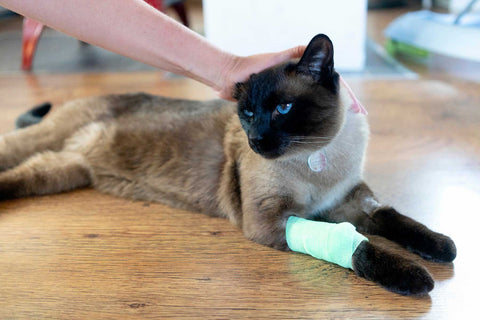Understanding Your Itchy Pet: A Pet Parent's Guide
Posted by Animal Care Team on
We pet parents know all too well the frustration and anxiety of seeing our furry family members uncomfortable, especially when they are constantly licking, scratching, and itching. While occasional scratching or licking is normal, compulsive behavior can indicate an underlying issue that requires attention. The good news is there are some easy ways to determine why your pet may be feeling itchy, and some simple steps to help them get some relief. Here are some of the top reasons they may be experiencing discomfort and what you can do to help:

Fleas & parasites
Fleas & parasites. Yes, fleas, ticks and mites are nasty, ugly, irritating critters. These tiny pests not only cause discomfort to your pet but can also infest their bedding and spread throughout your home. Flea infestations are one of the most common reasons that pets may scratch excessively and flea and tick bites can trigger allergic reactions, causing skin irritation. Fleas and ticks thrive in high grass, sand, sheds and debris – any place where they can find shade and humidity. Unfortunately, they can hop a ride on you or your pet easily and move into your house. Speak to your vet for recommendations on the best topical treatments and environmental management available for pest control. Bathing your pet with a natural medicated shampoo from Silver Honey® can help give soothing skin relief, and Silver Honey ointment and spray gel can avoid any secondary infections or scabbing from bites.

Allergies
- Ahhh-chooo! Just like us humans, our pets can develop allergies to various environmental triggers, including pollen, mold and dust mites -- and as the seasons shift, a variety of environmental changes can spur reactions. Another common source are ingredients in their food, especially the protein sources like chicken. Allergic reactions often show up as skin irritations including redness, inflammation and itching. If your pet exhibits some of these issues after playing outside, you can help identify the cause and reduce issues by avoiding having them roll in dry grasses, weeds, dead leaves and wet mildewy areas. If you see an issue when they haven't been outside, try changing their food to one with a novel protein like duck. If your furry friend continues to show discomfort, check with your vet to see if there may be an underlying issue or dietary allergy that needs medical management. A great way to help support a strong immune system along with healthy skin and coat is through nutrition. The vitamins, minerals and healthy balance of omega fatty acids in The Missing Link Skin & Coat Supplement can go a long way to a happy and healthy (as well has glossy and beautiful) pet.

Skin infections
Bacterial, fungal, and yeast infections can cause skin issues including itching, redness, and discomfort. Heat & moisture, debris in skin folds, and underlying health conditions can predispose your pet to infections; your best bet is to get a proper diagnosis via your vet to determine the causes. One step you can safely start at home is to use medicated shampoos and topical treatments such as Silver Honey® Hot Spot & Wound Care to quickly kill bacteria with natural but powerful ingredients including manuka honey and Microsilver. While treating the issue, the products protect the skin and provide immediate soothing relief.

Underlying health issues
Underlying health issues. Sometimes, itching can be a symptom of more serious health concerns, such as hormonal imbalances or autoimmune disorders. These conditions require thorough evaluation and specialized treatment, so if the steps you’ve taken don’t provide relief, see your vet. Early detection and management are crucial for improving fur-baby’s quality of life and can prevent future complications.
The next time your pet’s scratching seems excessive, take a closer look at the area they are scratching, and check their skin for redness and inflammation – or critter hitch-hikers. By being observant, keeping healthy natural nutritional and topical support products at the ready at home, and staying in touch with your vet, you and your pet can enjoy all this season’s adventures.
